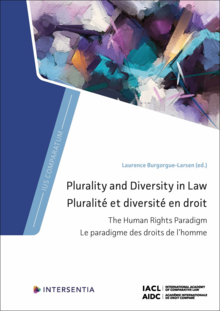Stéphane BEAULAC, Québec et Canada -- Pluralité, diversité et appréhensions propres des droits humains, dans Laurence Burgorgue-Larsen (dir.), Plurality and Diversity in Law: The Human Rights Paradigm (Cambridge: Intersentia, 2022), pages 267 à 283.
Consultez le site de l'éditeur pour plus de détails.
Résumé du livre (en anglais seulement):
Diversity and plurality are widely discussed in the contemporary human rights debate, in very different contexts. This book provides a better understanding of those two concepts, analyzing the legal systems of 23 countries – across Africa, Asia and Europe – and of two regional human rights systems (the European and Inter-American systems).
The book highlights two major elements: if there is no doubt that the majority of national legal orders are based on the principles of political liberalism - in other words, if the power of the liberal foundation is indisputable - the fact remains that multiple socio-historical constraints continue to weigh on the States which, for some, find it difficult to overcome the horrors of the past. Beyond the law, it was therefore necessary to take the measure of the reality and difficulties of the legal mechanism to profoundly transform societies divided either by colonization or by war in particular.
As for the power of the liberal foundation of the States, it generates two bold consequences: the neutrality of the State on the one hand and the protection of the rights and freedoms of the individual, but also the collective on the other hand. Indeed, the rights of human beings, like those of members of certain groups, constitute the heart of contemporary constitutional structures. Even if their protection takes different forms according to the legal culture of each country, their centrality is indisputable and essentially revealed by the vectors of dignity and equality, which involve prohibiting all forms of discrimination.
As for the weight of history, it explains the existence of significant differences considering the overall vision of democracy or even the importance of the weight given to a specific religion and/or specific customs. While there is nothing surprising about this element, what is surprising is to note that despite the adoption of constitutions with liberal values, and the promotion of individual and collective rights, some States are still strongly attached to their habits and customs, which can be considered, a priori, to belong to another age.











